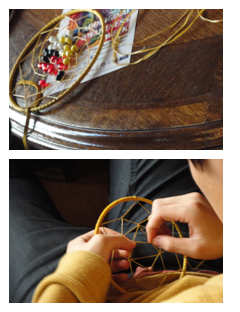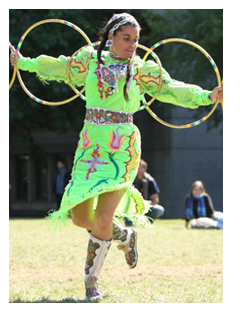
McGill's Vision: Indigenous Studies Program
Lev Bukhman Room (2nd Floor), SSMU Building, 3480 McTavish Street
11:00AM – 12:00PM
Since the early 2000s, efforts have been made to develop an Indigenous Studies program at McGill University. On November 27th 2012, a forum was held jointly by the Students’ Society of McGill University and the Social Equity and Diversity Education Office. This forum was held to consult members of the McGill community on their vision for an Indigenous Studies program.
An information session, presented by current and former SSMU VPs of University Affairs, Joey Shea and Haley Dinel, will highlight the forum’s report and to continue the dialogue.

Dreamcatcher Making Workshop (Staff and Faculty Only)
Arts Council Room (Room 160), Arts Building
12:00PM – 2:00PM
Explore your creative side and discover a First Nations traditional craft: the Dreamcatcher. The workshop will be led by Marie-Celine Charron from the Naskapis First Nation of Kawawachikamach.
Spaces are limited. Click here to reserve your spot!

Traditional Hoop Dancing Workshop
Lower Campus
2:00PM – 4:00PM
The Indigenous Student Alliance wants the McGill community to join them on the Lower Field for an interactive workshop on Indigenous hoop dancing. This will be an opportunity to get moving and discover traditional First Nation dancing.

Law vs. Justice: How the Courts are preparing the way for one last, fatal, round of treaty negotiations with Indigenous Peoples in Canada
Maxwell Cohen Moot Court (Room 100), New Chancellor Day Hall, 3644 Peel Street
5:30PM – 7:00PM
In interpreting section 35 of the Constitution Act, 1982, the Supreme Court of Canada has laid out a framework that relies heavily on outmoded concepts of colonial law. The Court has expressed a preference that the major work of reconciling Canadian sovereignty with Indigenous sovereignty should be done at the negotiating table. The Court has also emphasized “consultation” as the appropriate way for government to deal with conflicts between resource extraction and the historical claims of Indigenous peoples, but said that Indigenous peoples in those consultations can never simply say “no”.
In an era of mounting pressure to squeeze every ounce of economic value from Indigenous land, on an often breathtaking timetable, this Supreme Court doctrine condemns Canadian First Nations to take part in one last round of “Treaty” negotiations, where the stakes are sky-high, the cost of failure is potentially catastrophic, First Nations’ negotiating position has been undermined, and they may simply not have the resources to have lawyers and negotiators at the tables for as long as it takes.
About the Speaker:
Mary Eberts joined Hensel Barristers as counsel in 2013, after completing her term as Ariel F. Sallows Chair in Human Rights at the University of Saskatchewan. She has litigated in trial or appellate courts in most of the jurisdictions in Canada, in the Federal Court and Court of Appeal, in the Supreme Court of Canada, and at inquests and administrative proceedings, appearing as counsel in many leading cases. She has been litigation counsel for the Native Women’s Association of Canada for over twenty years, and was a co-founder of the Women’s Legal Education and Action Fund (LEAF).
Mary Eberts writes and lectures, nationally and internationally, on constitutional and Charter law, Indigenous law, and human rights. Ms. Eberts received her legal education at Western University and the Harvard Law School. She has been a faculty member at the Faculty of Law, University of Toronto, and held the Gordon Henderson Chair in Human Rights at the University of Ottawa. Before opening a specialized litigation practice in 1994, she was a partner at Torys in Toronto. Ms. Eberts grew up in southwestern Ontario, near Lake Erie, and is a mother and grandmother.
Organized by The Wallenberg Conference, honouring Raoul Wallenberg, the Swedish diplomat whose actions saved the lives of thousands of Jews in Hungary during the Second World War.




